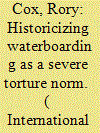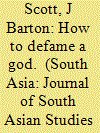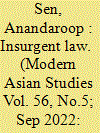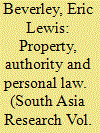|
|
|
Sort Order |
|
|
|
Items / Page
|
|
|
|
|
|
|
| Srl | Item |
| 1 |
ID:
163102


|
|
|
|
|
| Summary/Abstract |
The debate on waterboarding and the wider debate on torture remains fiercely contested. President Trump and large sections of the US public continue to support the use of waterboarding and other so-called ‘enhanced interrogation techniques’ as part of the ‘War on Terror’, thus putting the anti-torture norm under pressure. This article demonstrates that the re-imagining of waterboarding as ‘torture-lite’ is contradicted by the long history of waterboarding itself. Examining pre-modern uses and descriptions of torture and waterboarding, this article highlights that the post-2001 identification of waterboarding as a relatively benign interrogation technique radically inverts a norm that has predominated for over 600 years. This historical norm unequivocally identifies waterboarding not only as torture but as severe torture. The article highlights the value of historically contextualizing attitudes to torture, reviews how and why waterboarding was downgraded by the Bush Administration, reveals the earliest explicit description of waterboarding from 1384, and argues that the twenty-first-century re-imagining of waterboarding as torture-lite is indicative of the fragility of the anti-torture norm.
|
|
|
|
|
|
|
|
|
|
|
|
|
|
|
|
| 2 |
ID:
140456


|
|
|
|
|
| Summary/Abstract |
This article argues that competing ideas about the nature of public selfhood structured the Maharaj Libel Case, as well as colonial publics more broadly. Jadunathji Maharaj had, in effect, lost his libel suit even before it went to court. For libel law, the essence of the human person is a private self that owns various forms of property, including the public persona known as ‘reputation’. For the Hindu Pushtimarg, meanwhile, the Maharaj was considered an incarnation of Krishna; his religious or public self preceded and was the ontological ground for his merely personal being. To compare these two conceptualisations of the self is to see how selfhood became an important site for the articulation of the public in colonial India.
|
|
|
|
|
|
|
|
|
|
|
|
|
|
|
|
| 3 |
ID:
187285


|
|
|
|
|
| Summary/Abstract |
This article studies the adjudicatory practices deployed by colonial military and police forces during a series of punitive British expeditions in the eastern frontiers of British India and the northern reaches of British Burma, specifically the Lushai and Chin Hills in the late nineteenth century. It magnifies the lives, deaths, and afterlives of two ‘tribal’ chiefs of Lushai Hills. Among others, these figures were held responsible for a series of raids carried out in the settled British territories of the northeastern frontiers in the 1890s. After a few inconclusive skirmishes with the British expeditionary force, they were apprehended and imprisoned in a jail in Hazaribagh under the preventive detention act of Bengal Regulation III of 1818, which was reserved and designed to arrest political dissidents of the empire. After a few months, two of them, Liengpunga and Khalkam, were found hanging from the windows of their prison latrine. The British administration labelled these deaths as suicides and closed the cases. The article opens them up. In doing so, it narrates an oblique history of the Scheduled District Act of 1874 which removed hill districts from the jurisdictions of regular courts. By focusing on the historical imbrication of Bengal Regulation III of 1818 in the Scheduled District Act, the article highlights the punitive techniques embedded in the seeming protectionist impulse of the colonial state, something that persists in India's administration of the Northeast region. Closer to the concerns of this issue, it reflects on a legal genealogy of tribal subjects in South Asia.
|
|
|
|
|
|
|
|
|
|
|
|
|
|
|
|
| 4 |
ID:
106554


|
|
|
|
|
| Publication |
2011.
|
| Summary/Abstract |
British rule in South Asia transformed the economy and society of the subcontinent, in large part by revamping the status of landed property. Colonial law was founded on the notion that ostensibly religious personal law was outside state jurisdiction. The boundary between state law and personal law, however, was blurry and some elements of 'religious' law had major implications for matters at the core of colonial policy, such as property control. This ambivalence produced a scenario in which legal debates became authorised spaces for colonial subjects to pursue their agendas.
Taking the Muslim charitable trust, or waqf, in late colonial British India, this article argues that advocacy of substantive and procedural changes in waqf laws by Muslim legal activists repre-sented a pointed critique of colonial policies. Through a brief history of the articulation between charitable trusts and colonial property policies, the article draws from the work of two late colo-nial Muslim judges, Syed Ameer Ali and Faiz Badrudin Tyabji, to demonstrate the role waqf debates played in refashioning colonial legal culture. It is suggested that claims about waqf were both instrumental attempts to advance claims to property, and instances for articulating broader ideological critiques of the interpretative authority of British judges.
|
|
|
|
|
|
|
|
|
|
|
|
|
|
|
|
|
|
|
|
|